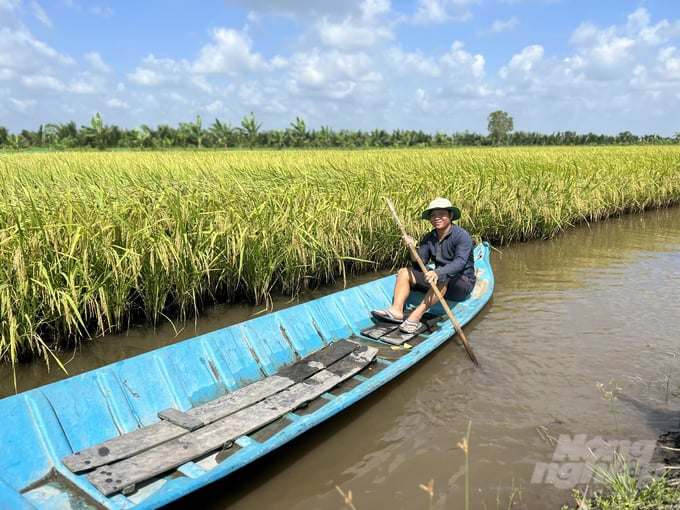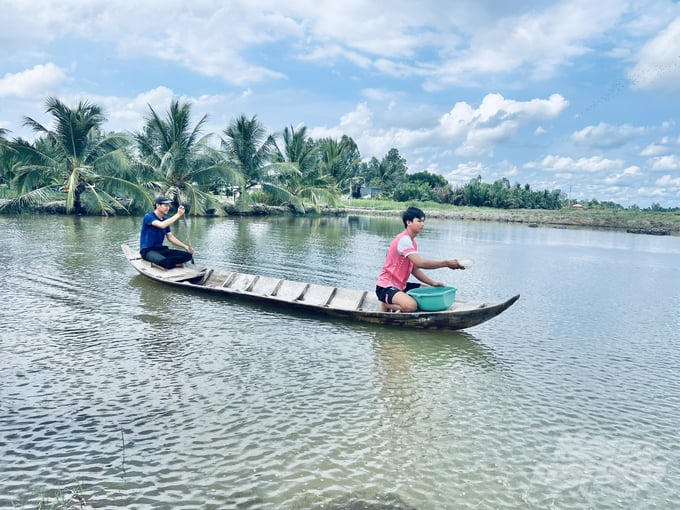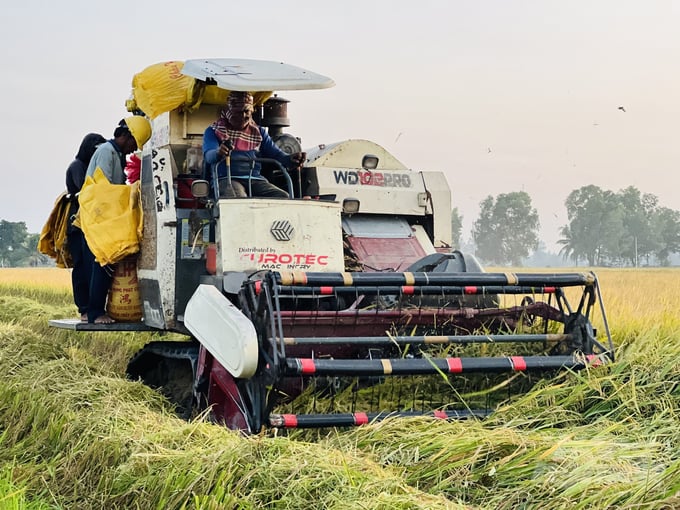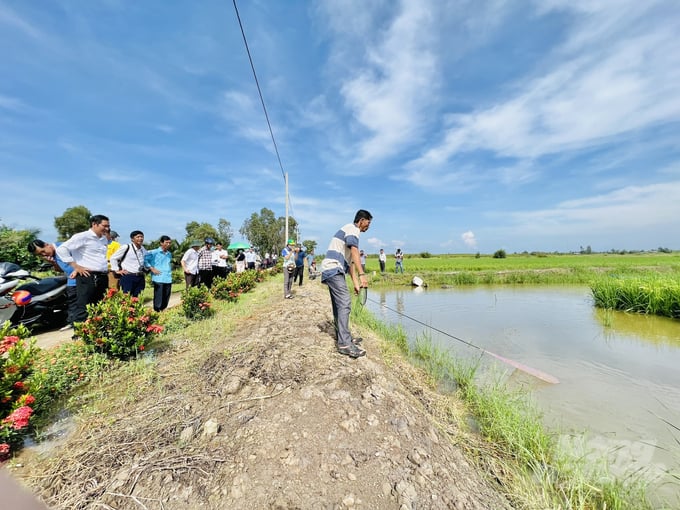May 29, 2025 | 22:21 GMT +7
May 29, 2025 | 22:21 GMT +7
Hotline: 0913.378.918
May 29, 2025 | 22:21 GMT +7
Hotline: 0913.378.918

The World Conservation Union in Vietnam will expand the area of responsible rice and shrimp production in the Mekong Delta to 30,000 hectares in the period 2023 - 2032. Photo: Trong Linh.
Ca Mau Provincial People's Committee collaborated with representatives of World Wild Fund Vietnam and Minh Phu Certified Shrimp Ltd.Co (Ca Mau) to promote the development of a rice-shrimp production area that is responsible. From 2023 to 2032, Ca Mau province will increase the responsible rice-shrimp production area in areas with favorable conditions and the Mekong Delta region to 30,000 hectares, based on its initial success.
A representative of Minh Phu Certified Shrimp Ltd.Co stated that the company has implemented a pilot project in the Tri Luc commune rice-shrimp area in Thoi Binh, Ca Mau province, with the participation of 17 farminh households and the technical support of WWF Vietnam and Deltares – Netherlands.

The model helps participating farmers earn 2.8 times more profit than outside households. Photo: Trong Linh.
The results indicate that the productivity of whiteleg shrimp exceeded 400kg/ha, that of rice reached 4.7 tons/ha, and that of green tiger shrimp reached 350kg/ha. As a consequence, the profits of farmers who participated in the initiative increased by a factor of 2.8 compared to those who did not, particularly in areas where shrimp farming was integrated with rice cultivation in Tri Luc commune, in accordance with international ASC standards.
In light of the initial success, the project's stakeholders have announced intentions to increase the agricultural area in the Mekong Delta region to 30,000 hectares between 2023 and 2032. During Phase 2 (2023-2024), they will expand the shellfish aquaculture area in the Tri Luc commune to 150 hectares. The project's long-term objective is to promote sustainable rice and shrimp development by increasing the capacity and awareness of responsible and environmentally favorable production among the involved households and businesses.

Products from the rice-shrimp model according to international certification will bring high economic value to farmers. Photo: Trong Linh.
By adhering to ASC standards, shrimp farmers hope to increase shrimp productivity to 500 kg/ha, which is roughly double that of conventional farming methods, and to triple their income. In addition, the profit objective is set at a minimum of 100 million VND per hectare per year, with all products being sold at a premium of approximately 5,000 VND per kilogram.
Mr. Le Van Su, Vice Chairman of the People's Committee of Ca Mau Province, stated that the province, along with its residents participating in the rice-shrimp farming model, supports and will in the near future actively promote the project chain in accordance with international ASC standards, thereby contributing to the advancement of sustainable shrimp farming.
However, Mr. Su expects that the initiative will be expanded beyond the Thoi Binh district farming area to other suitable rice-shrimp farming regions. Concurrently, it is necessary to examine the viability of assisting individuals in gaining access to financing through enterprises and enhancing infrastructure to support production.

The rice-shrimp model in Tri Luc commune, Thoi Binh district (Ca Mau) achieved the first ASC Group certification in Vietnam, also the first certification in the world. Photo: Trong Linh.
In October 2022, Control Union, a global independent certification organization for goods management and monitoring, granted the ASC Group International Standard Certification to a portion of the integrated rice and white-leg shrimp farming area in the specialized rice-shrimp farming region of Thoi Binh district. This is the first area of integrated whiteleg shrimp aquaculture and rice cultivation to receive ASC Group International Standard Certification in Vietnam and the first certification of its kind in the world.
Ca Mau's whiteleg shrimp products will gain access to the world's most demanding markets upon obtaining ASC Group certification, contributing to an increase in the value of commodities and a sustainable income for producers.
The shrimp industry in Ca Mau accounts for 80% of the total production value and 49% of the total agricultural production value of the province, with approximately 280,000 hectares devoted to shrimp farming, of which approximately 38,000 hectares are used for rice-shrimp farming. The relevant authorities in Ca Mau hope that by 2030, one hundred percent of the rice-shrimp agricultural areas will be certified as organic, ecological, ASC (Aquaculture Stewardship Council), etc.
Translated by Linh Linh

(VAN) The mutual export of agrifood products between the European Union (EU) and the United Kingdom (UK) must occur again without certification, border controls or other red tape. This was agreed at the UK-EU summit.
/2025/05/22/5121-2-173645_677.jpg)
(VAN) NBSAP Tracker identifies strengths and areas for improvement in the National Biodiversity Strategy, based on each region’s priorities and capacities.

(VAN) The draft amendment to the Circular on rice export trading stipulates a periodic reporting regime for rice exporting enterprises.

(VAN) Dong Thap farmers attained an average profit margin of 64% during the summer-autumn 2024 crop (first season), while An Giang and Kien Giang farmers followed with 56% and 54%, respectively.

(VAN) As a doctoral student doing research on renewable energy and electrification at Harvard University, the author shares his musings on electricity, nature, and countryside memories.

(VAN) The decree on Extended Producer Responsibility (EPR) ensures transparent management and disbursement of support funds, avoiding the creation of a “give-and-take” mechanism.

(VAN) Hue City rigorously enforces regulations regarding marine fishing and resource exploitation, with a particular emphasis on the monitoring of fishing vessels to prevent illegal, unreported, and unregulated (IUU) fishing.